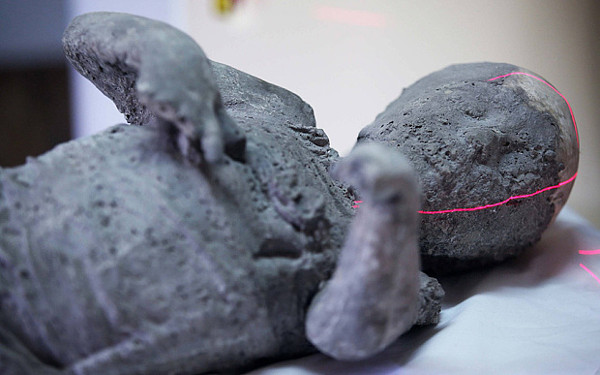The secret of strong teeth of ancient Romans
The CT scan results showed that the Romans killed in a volcanic eruption nearly 2,000 years ago had strong teeth thanks to a diet low in sugar and lots of vegetables.
The mystery of the teeth of ancient Romans
According to CNN, researchers are studying petrified corpses in the volcanic eruption of Vesuvius in 79 in Pompeii, near present-day Napels in Italy. They died of asphyxiation of smoke and ash falling into their bodies, gradually turning into pumice, forming stones inside with intact bones and teeth.

A stone man in Pompeii, Italy.(Photo: Telegraph).
"Their teeth are really strong. They eat a little sugar, lots of fruits and vegetables ," Elisa Vanacore, a dentist said at a press conference last week. What the ancient Romans nearly 2,000 years ago ate like the modern diet of Mediterranean people - the area where people have a longer life than southern Europe.
Scientists will continue to study the rest of the ancient Romans kept in these stone people.
"The research process will reveal many of the victims such as age, gender, food, even the illness they had and the social class," said Masimo Osanna, manager of Pompeii's relics site. know. "This will be our big step in ancient social research."
The low-sugar diet of the ancient Romans meant that they had less dental problems than modern humans. High sugar consumption is thought to cause tooth decay, obesity, cardiovascular disease and diabetes.

Queen Elizabeth I is famous for her bad teeth because she likes to eat sweets.(Photo: CNN).
Queen Elizabeth I is famous for her bad teeth, because she likes to eat sweets. Sugar is a widely used additive in food today. However, until the 16th century, it began to be popular in the West Indies and the Americas. By 19750, it had surpassed cereals, becoming the most valuable commodity in Europe, accounting for one-fifth of all imports into the continent. According to the US Department of Agriculture, global sugar consumption is forecast at 173.4 million tons this year.
- How to help Romans have beautiful white teeth without toothpaste
- Funny death of ancient Romans
- The diet of 'sea breeze' of ancient Romans
- Shocking discovery of the 2.3kg hand of the Romans
- The culprit makes us infected with worms, lice are ... ancient Romans
- The secret of ancient Roman emperor's cloak
- The secret of the sea urchin's sharp teeth
- Ancient Romans were the agents of climate change in Europe 2,000 years ago
- Detecting 1,000 human teeth in the walls of ancient buildings in America
- The secret to slim waist shape since ancient times
- Discovered 560,000-year-old milk teeth of ancient people
- Antiquity 'cure' for ancient Romans
 Discovered an ancient centipede fossil 99 million years old
Discovered an ancient centipede fossil 99 million years old Discovered bat-like dinosaurs in China
Discovered bat-like dinosaurs in China Discovered a 200-year-old bronze cannon of the coast
Discovered a 200-year-old bronze cannon of the coast Discover 305 million-year-old spider fossils
Discover 305 million-year-old spider fossils